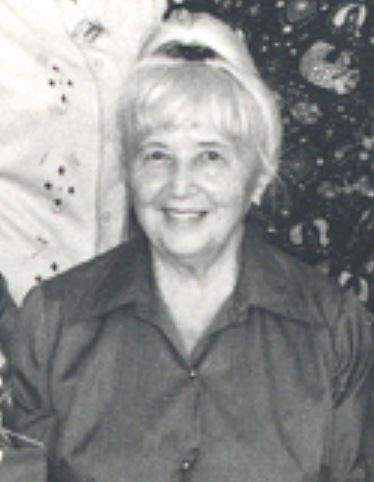Wanda Kiedrzyńska, née Puzinowska
01.01.1901 (Łodz) – 30.03.1985 (Warszawa)
Historian
Ravensbrück: 30.05.1942 - 28.04.1945
One of her great merits is the preparation of a monograph dedicated to the Ravensbrück women's concentration camp, which had several editions and has so far been considered the best source for learning about the history of this concentration camp. This monograph is entitled "Ravensbrück Women's Concentration Camp" ("Ravensbrück - kobiecy obóz koncentracyjny").

Wanda Kiedrzyńska 1974, Fotoalbum für Rosa Jochmann, DÖW Wien
Wanda Kiedrzyńska was born in 1901. She was a historian. Until the beginning of World War II, she lived in Warsaw and worked in the military history office.
After Germany's invasion of Poland on September 1, 1939, she was active in the underground movement together with her husband Karol, an officer in the Polish military.
After she and her husband were betrayed, they were detained in Pawiak Prison. After interrogations by the Gestapo, the Kiedrzyński couple were sentenced to imprisonment in a concentration camp: Wanda Kiedrzyńska was deported to Ravensbrück, her husband to Auschwitz, where he died in 1942.
Wanda Kiedrzyńska arrived at the Ravensbrück concentration camp on May 30, 1942 on the second special transport from Warsaw and Lublin. In the concentration camp she was involved in the secret educational work, gave lectures and led discussions. The focus was on shaping a free Poland and the question of the need for social reforms.
After the liberation from Ravensbrück, Wanda Kiedrzyńska returned to Warsaw and moved into an apartment with her mother in the Marymont district. She immediately started working at the Institute of History of the Polish Academy of Sciences.
Together with another survivor from the Ravensbrück concentration camp, Olga Dickman, she founded the Ravensbrück Club in autumn of 1945 and became its first chairwoman. For several years she was involved in the club and took care of the women who were members there by supporting the former female prisoners in various ways, documenting the history of the Ravensbrück concentration camp, as well as anniversary meetings, commemorations and meetings of the survivors who became friends were organized.
Undoubtedly, her great merit is the preparation of a monograph dedicated to the Ravensbrück women's concentration camp, which had several editions and has so far been considered the best source for learning about the history of this concentration camp. This monograph is entitled "Ravensbrück Women's Concentration Camp" ("Ravensbrück - kobiecy obóz koncentracyjny").
She was the representative of the Polish side in the International Ravensbrück Committee. In this context, it significantly shaped the only international science conference in Poland, which was dedicated to the Ravensbrück concentration camp and which took place on May 7th - 8th, 1971 in Jaszowiec. The meeting was dedicated to the subject of the resistance movement in the Ravensbrück concentration camp in all national groups that were imprisoned there.
Dr. Kiedrzyńska, as co-organizer, gave the introductory lecture in which she outlined the aim of the conference as well as the resistance movement in its various forms, the demographic characteristics of the inmates, as a starting point for assessments and conclusions and the bibliography about the Ravensbrück concentration camp. In her statement, Dr. Wanda Kiedrzyńska among others: * “Why did we organize this meeting? We wanted to bring about a confrontation of opinions on the important area of our life at that time, the time in Ravensbrück, with the secret struggle for survival and at the same time for human dignity. I am not afraid to use the big word "fight". It was an uninterrupted, silent struggle for survival, which at times manifested itself outwardly, in various forms. " *
She earned special merits by collecting documentation on pseudo-medical experiments to which 74 Polish women were subjected in Ravensbrück. She worked with what was then the museum of the Ravensbrück Memorial. Thanks to their efforts, the transport lists to the Ravensbrück concentration camp have largely been reconstructed. In the implementation of this very important work, Dr. Kiedrzyńska was supported by the Panak sisters.
Dr. Kiedrzyńska's research area was the martyrdom of the Polish population during the German occupation of Poland in World War II. She is the author of the research paper “At the border between life and death. Krystyna Wituska's letters and receipts from prison ”(“ Na granicy życia i śmierci. Listy i grypsy więzienne Krystyny Wituskiej ”); Krystyna Wituska was executed with the guillotine on June 26, 1944 in the German prison in Halle for intelligence work.
The scientific life work of Dr. Kiedrzyńska includes numerous contributions, including a valuable publication “Warsaw Uprising in Books and Press. A bibliographical guide ”(“ Powstanie Warszawskie w książce i prasie. Poradnik bibliograficzny. ”) The above. The monograph “Women's Concentration Camp Ravensbrück” (“Ravensbrück - kobiecy obóz koncentracyjny”) has become her doctoral thesis.
She died in Warsaw in 1985. She was buried in the Stare Powązki cemetery (in the family crypt in section 124, next to her mother Maria Puzinowska, née Wolanowska (1877-1955), and symbolically next to her husband Karol Kiedrzyński (1897-1942, died in Auschwitz) .
Foto: Wanda Kiedrzyńska 1974, photo album for Rosa Jochmann, DÖW Vienna